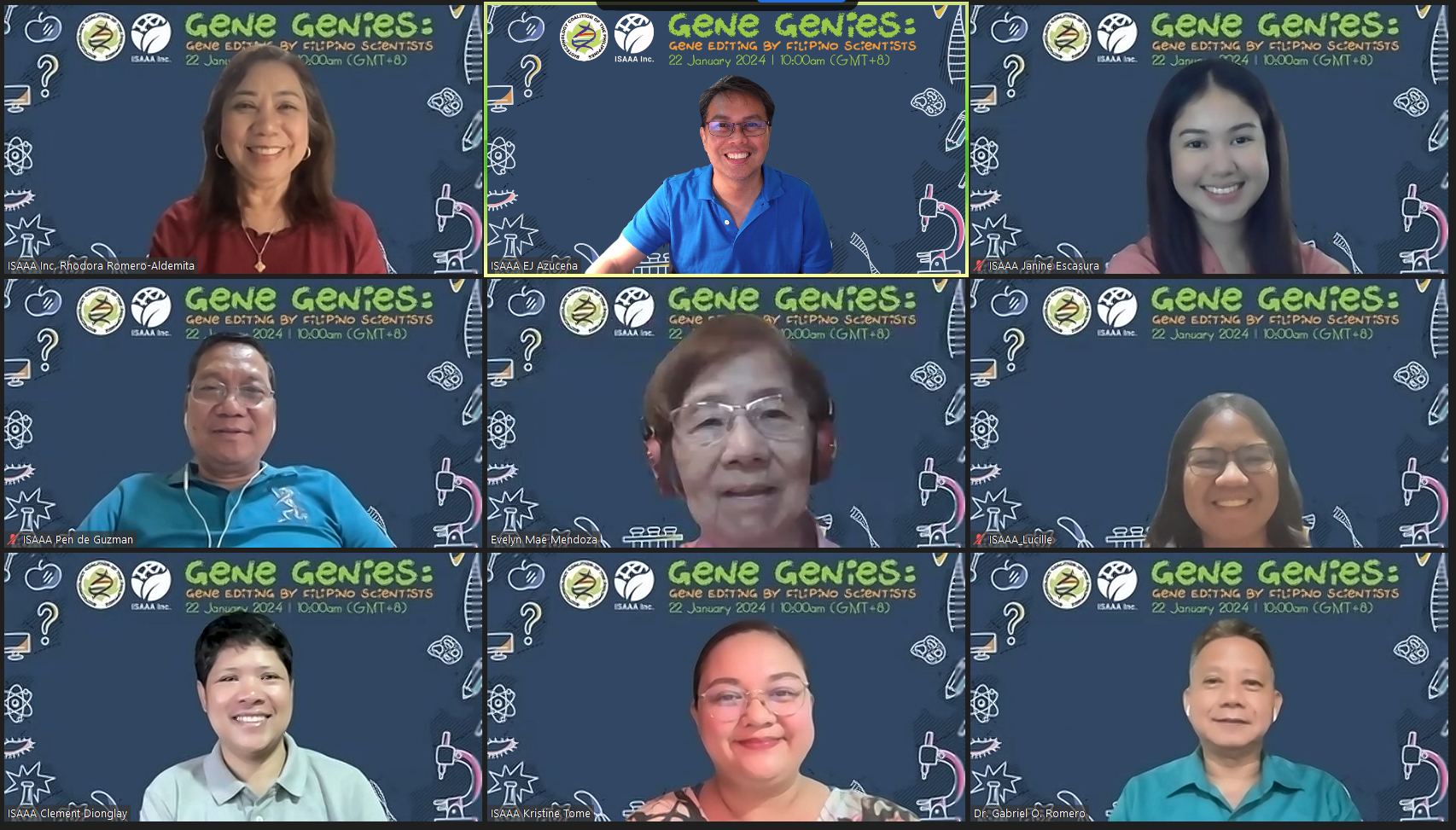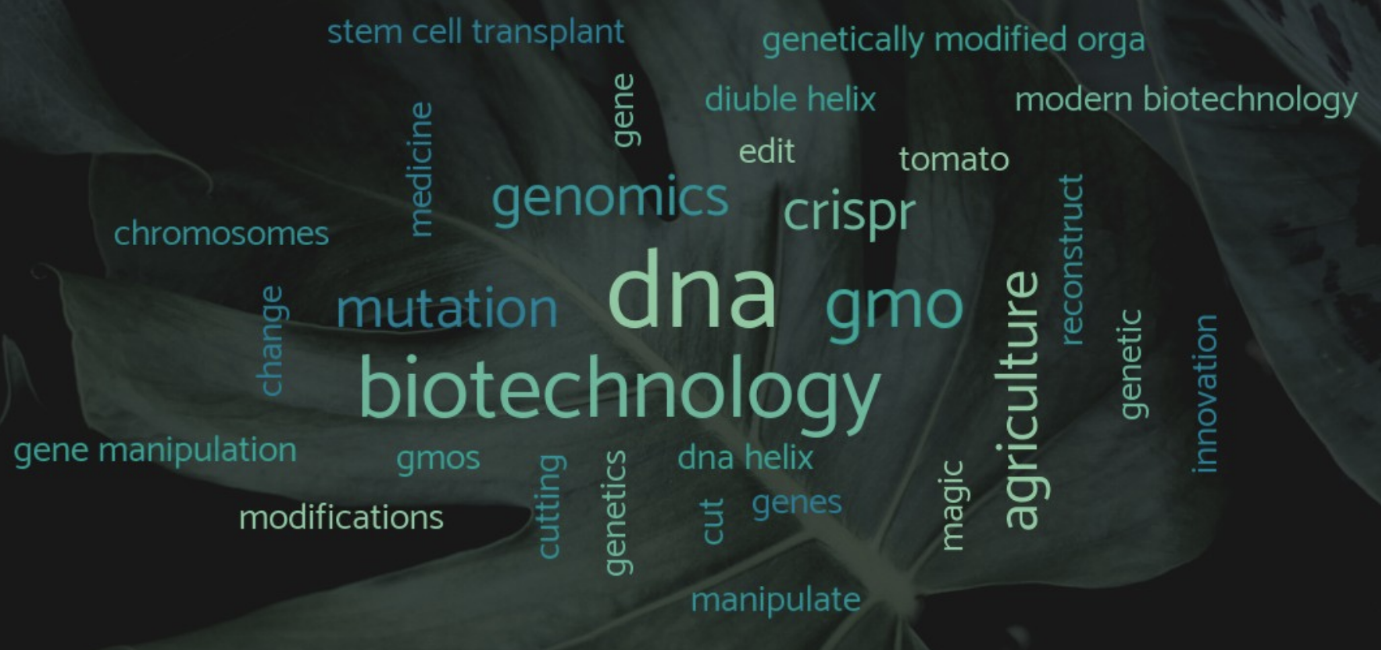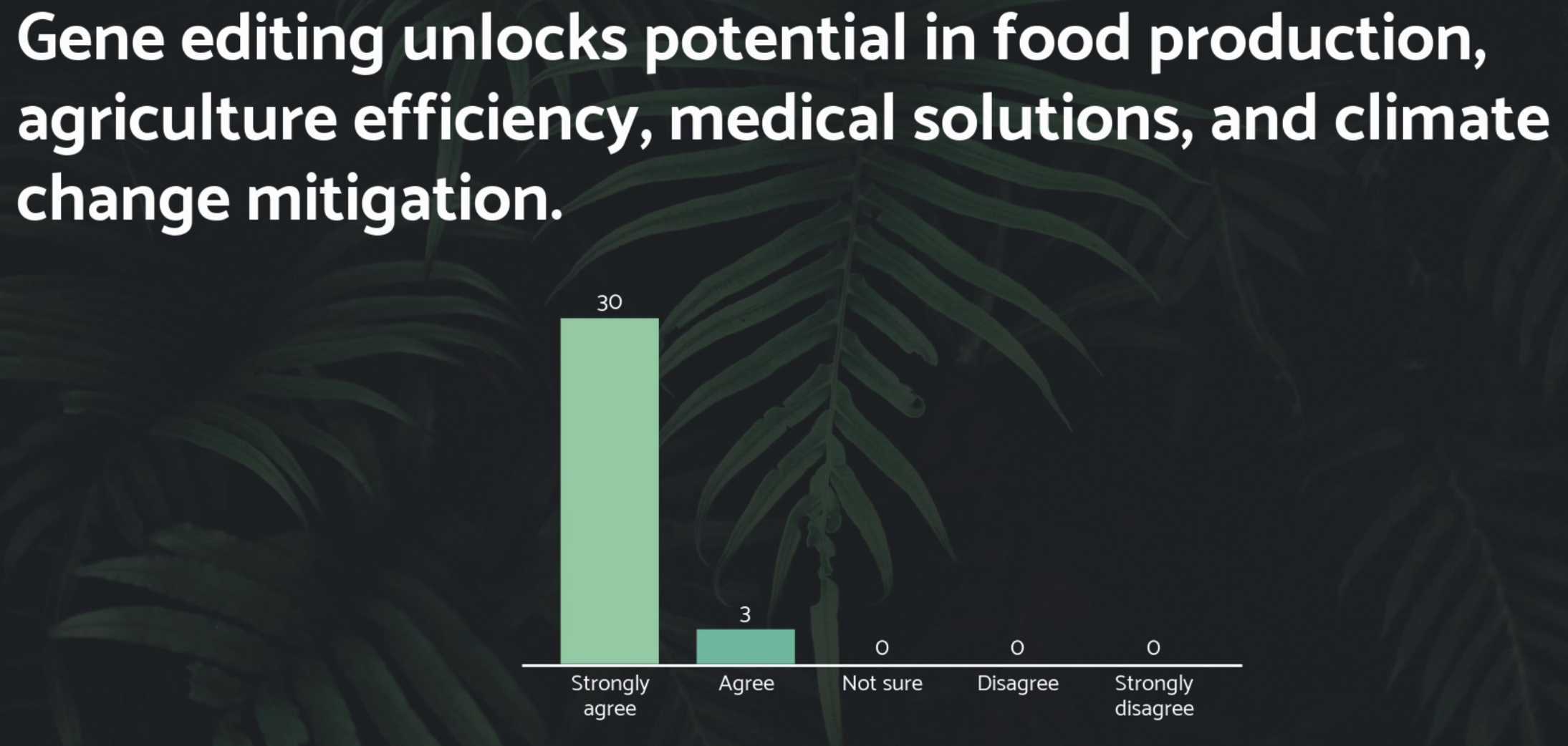Gene Editing Made Simpler for the Youth
| |
Gene editing is a widely used technique by researchers around the world. However, the general public, especially the younger generation, may have difficulty understanding this emerging technology.
ISAAA Inc., in collaboration with the Biotechnology Coalition of the Philippines, Inc. (BCP), organized a webinar to raise awareness and appreciation of high school students and teachers about gene editing and its potential benefits to contribute to addressing the challenges of food/agriculture, environment, and climate change. The webinar titled Gene Genies: Gene Editing by Filipino Scientists also aimed to cultivate a science culture among the students and build confidence to pursue science careers. The webinar, held on January 22, 2024, via Zoom, had a total of 66 participants from 17 different schools in the Philippines. This article highlights the essential points that were discussed during the webinar.

Academician Dr. Evelyn Mae Tecson-Mendoza of the National Academy of Science and Technology of the Philippines and Board Member at the Biotechnology Coalition of the Philippines, welcomed the participants and gave a brief background about the state of modern biotechnology in the Philippines. “Modern biotechnology used to have its share of concerns in terms of safety. This 2024, we have witnessed the safety of the GM foods that were approved and released in our country as food, feed, direct use, and processing,” Dr. Mendoza explained.
Gene Editing 101
Dr. Maribel Zaporteza, Assistant Professor at the University of the Philippines Los Banos-Institute of Biological Sciences, introduced the technology to the participants. She defined gene editing as a technique that can cause gene insertion or disruption in a chosen genetic region using site-specific nucleases.
Dr. Zaporteza gave a breakdown of the requirements for gene editing, which consist of available genome information, established transformation process, regeneration protocol, and assay system. She also discussed how CRISPR-Cas9 technology was discovered and utilized for improving organisms, and emphasized its benefits, such as lower cost and easy usage.
Dr. Zaporteza differentiated conventional breeding, genetic modification, and gene editing. She also gave examples of gene-edited products, such as gene-edited mushrooms and Sea Bream. She concluded her talk by mentioning that “Gene editing is a promising tool to increase DNA variation, thus giving an increased opportunity to develop advanced crops.”
Gene Editing Research in the Philippines
Dr. Gabriel Romero, Executive Director at the Philippine Seed Industry Association, explained how crops are genetically modified through different processes, such as traditional breeding, mutagenesis, transgenesis, and gene editing.
Dr. Romero provided examples of gene editing research in the Philippines. He mentioned resistance to bacterial leaf blight (BLB) disease in rice, rice tungro resistance, optimal amylose content in rice, and high lycopene tomato. He also highlighted the benefits of gene-editing in microbes to improve products for health and the food industry. “Gene editing can help our farmers, and this will increase investment and career opportunities in the seed industry,” he emphasized.
Youth’s Perceptions of Gene Editing
Prior to the discussions, the participants were asked about the words that they associate with gene editing. The most common answers were DNA, biotechnology, mutation, and genomics.

After the discussions, the participants were asked about the important things that other people should know about gene editing. Some of them answered that it is safe, beneficial, and advantageous to humanity and the environment if appropriately practiced. An increase in acceptance of the technology was observed among the participants after the presentations. More participants strongly agreed that gene editing is beneficial to food, agriculture, healthcare, and climate change mitigation.

The webinar participants were also encouraged to participate during the open forum. One of the attendees asked about the advantages of gene editing and if it is healthy for human consumption. “Gene editing is very helpful for scientists and breeders because it is a more efficient tool for them. However, in terms of product quality, GM crops don't fall behind and have already been proven to be safe. Gene-edited crops are also well-characterized, and the molecular nature of the crops is already known,” Dr. Romero answered.
Another participant asked if there are gene-edited products in our healthcare. “There are companies in the USA that are approved to produce CRISPR-based medication to fix the mutation of sickle cell disease. Hopefully, more hospitals will be able to have this kind of treatment,” Dr. Zaporteza answered.
When the participants were asked for feedback after the seminar, one attendee said, "Everything was explained so well that I think I worried in vain. The short audience participation segments were enjoyable, so I hope they will be retained for future webinars." Another participant also mentioned that “Filipinos could benefit a lot from this information.”
The webinar triggered the interest and appreciation of the Filipino youth. Dr. Rhodora Romero-Aldemita in her closing remarks encouraged the participants to check out the resources at the ISAAA Inc. website, pursue more studies in biotechnology, contribute, and be a part of the cadre of scientists in the growing field of gene editing.
Registration for Gene Genies: Gene Editing by Filipino Scientists (Applications in Livestock and Aquaculture) is now open for Filipino high school students and teachers. For more information about gene editing, visit our resource page.
| Newer Post | Archive | Older Post |
Science Speaks is ISAAA Inc.'s official blog. Weekly blog articles, authored by ISAAA writers, partners, and invited contributors, aim to help share, disseminate, and promote scientific knowledge and its vital role in achieving global agricultural sustainability and development. Your support to Science Speaks will help us achieve this goal. You can help us by donating as little as $10.

